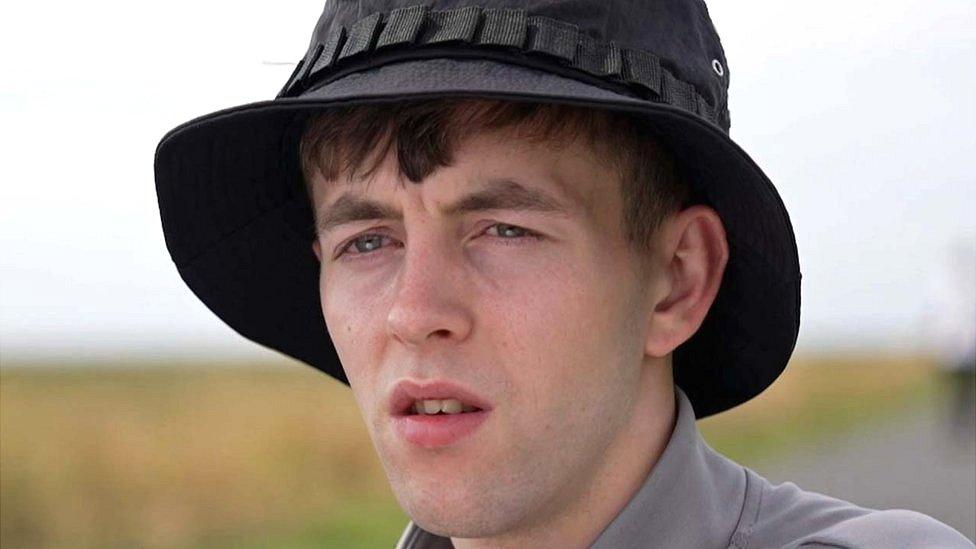Why have so many children's homes opened in Blackpool?
- Published

Many vulnerable young people from across the UK have ended up in children's homes in Blackpool in the past few years. But the approach - in part because of a national shortage of places elsewhere - is raising concerns.
Thanks to the pandemic, staycation tourists have flocked back to the Lancashire resort over the past two summers. Alongside the familiar Pleasure Beach and amusement arcades is a smart new California-style beach cafe.
But few visitors will have noticed that, at the same time, Blackpool has taken on a new status - as an epicentre of children's homes.
Blackpool already has the highest proportion of its own children in care in England - but with property in the resort town being relatively cheap, and with a surge in the national demand for places, some local providers have expanded rapidly.
BBC analysis of the latest Ofsted data shows of the 39 children's homes in the two Blackpool parliamentary constituencies, 29 have been registered only since 2016. As a result, children have been sent from across the country to children's homes in Blackpool and adjacent areas.
Jade, 21, from London, was placed in a home just outside the town when she was 16 and stayed there for 18 months.

Jade kept away from the centre of Blackpool at night
She recalls how she "burst out in tears" when she arrived because her family were hundreds of miles away.
"I'm thinking: 'How am I going to see my mum? How am I going to see my sisters?' I didn't even have a phone at this point."
Blackpool is one of the most deprived towns in England and a focus of the Johnson government's levelling-up agenda.
Behind the seafront are shabby streets of run-down houses. Rates of mental illness and drug abuse are high. According to the Health Foundation, external, both men and women in Blackpool have the lowest healthy life expectancy in the UK.
During her time in the resort, Jade learned to avoid the town centre at night, when she says she would see drunks and drug users.
"In the summertime it's nice, it's touristy - but night-time hits and it's a different land," she says. "It's a kind of chaos, not fun chaos - it's [a case of] be aware, be very vigilant."
Clive Grunshaw, the former Labour Lancashire Police and Crime Commissioner, warns that Blackpool was not the right place to send vulnerable young people from other parts of the country.
He says there is a "significant demand" for drugs in the town and that so-called county lines gangs from Merseyside, Manchester, even London, send operatives to sell there - using "extreme violence" to control their share of the trade.
The young people in children's homes have often already been in traumatic situations, he says. "And then you leave them unsupported in a place where there could be issues of anti-social behaviour and criminality, the last role models you'd like to see them mix with."
Joe was also sent to a children's home in the heart of Blackpool aged 16. He describes himself back then as "a tiny kid".
Though he was from Preston, only 20 miles away, he says he felt very isolated and unsafe by the sea. He recalls there were five other children's homes near the one in which he lived.
He says the area was full of "crackheads, prostitutes and drugs" and he was frequently attacked.
"I've been jumped, I've been chased, I've had knives pulled on me… I've had everything done to me."

Joe says he felt unsafe in Blackpool
Erin, who is now 18, was in a different home not far from Joe's.
She says some of the girls being looked after with her would take drugs and sleep with older men. "I was just so paranoid. I didn't go out by myself, ever," she adds.
Almost all the children's homes in Blackpool are run by private companies. Increasingly, such companies own and manage homes across England. Children remain the responsibility of their local authority, but the homes look after the young people day-to-day.
The fact that so many children are being moved far away from their neighbourhoods should "ring alarm bells", says Katharine Sacks-Jones, CEO of Become, the national charity for children in care and young care leavers.
But Blackpool Council has no control over how many children are placed in the town from other authorities - or how far from home they are.
Although it is starting flex the powers it does have. The council must grant planning permission to new homes for children up to the age of 16, and, in recent years, with ever more applications, local residents have started to object strongly.
In 2019 for example, in a road in the north of the town, local company Outbound Care applied for permission to turn a semi-detached bungalow into a care home for two young people. Local people protested. One neighbour wrote they were "absolutely distraught" at the thought of young displaced people with "behavioural problems" living so close them. The application was withdrawn but two more followed, with neighbours objecting on each occasion.
At the same time, Blackpool Council decided to change its planning rules.

A child on a bike near Blackpool Pleasure Beach
It refused to approve new applications within 400 metres of existing children's homes. The policy however - formally adopted in 2021 - may only cover Ofsted-registered homes as the council does not need to be notified about supported accommodation for looked after children and care leavers aged 16-17.
The town's head of planning said it was important to "try and stem the flow of vulnerable youngsters into the borough from outside".
That sentiment has been echoed by the Conservative MP for Blackpool North and Cleveleys, Paul Maynard - the most outspoken local critic of the local "proliferation" of children's homes. He was one of those who objected to Outbound Care's plans to change the bungalow in north Blackpool into a children's home.
Outbound Care was only incorporated in 2017, according to Companies House records. Ofsted data shows it has five children's homes in the Blackpool area - one was registered in 2017, four in 2019.
But by far the biggest operator in the Blackpool area is Sandcastle Care, which was originally founded in 2003 - but taken over in 2015 by a local entrepreneur, Darren Yates.

Darren Yates (left) has a love of horse racing
"If you're talking about children's homes [in Blackpool], people think Sandcastle immediately," says Mr Maynard. He says the care provider has been successful in its own terms but he questions whether the company has benefitted the town or the young, vulnerable residents of its homes.
Darren Yates, a joiner turned property developer and racehorse owner, expanded Sandcastle Care from three homes to 53 - almost all in Blackpool and adjacent areas - before selling the company to Waterland Private Equity. Specialist accountant Andrew Rome estimates the sale price would have been about £20m. Mr Yates resigned from the boards of Sandcastle's holding companies last year.
We twice asked Mr Yates for an interview to discuss the rapid expansion of Sandcastle Care and local opposition to some of the homes. He didn't respond.
The great majority of Sandcastle homes are rated "good" or "outstanding" by Ofsted and the company told us it was "committed to serving the best interests of the young people" entrusted into its care. It said 70% of the children it cares for at the moment are from local authorities in the north-west of England.
Joe, Jade and Erin were not in homes run by Sandcastle or Outbound Care.
While Ofsted data shows five new homes were opened in Blackpool in the financial year from 2021, the council told us its new policy of tighter planning rules is now having an effect. In a statement it said that "so far this year we have not received any applications for new homes."
Mr Maynard says he welcomes the council's efforts, though he's concerned the policy may drive children's homes' applications into adjacent areas with similar housing stock. Part of his constituency spreads out several miles north from Blackpool.
"I would urge councils from outside Blackpool to think twice over sending their children here merely because that's where the capacity happens to be.
"They clearly have the interests of those vulnerable young people first and foremost in their minds - find the right location for them."
But it's hard for councils to do that when they have little, if any choice.
Ofsted's chief inspector, Amanda Spielman, says there needs to be control and oversight over who can own and run children's homes.
She adds: "We have companies now in the market who really don't have very much interest in childcare, sometimes buying and selling homes or groups of homes quite rapidly and building groups of homes in specific areas that aren't necessarily where the children who most need those places live or even close to where they live."
Ofsted's latest report on the sector, published last month, said there was a significant shortage of places in children's homes and that some children were living "in places where their needs couldn't be met".
The Department for Education said it was working closely with Ofsted to explore additional new powers that would strengthen its regulatory ability.
The government will also respond later this year to recommendations on revising legislation to improve market oversight from both the Independent Care Review and the Competition and Markets Authority.
Related topics
- Published29 June 2022

- Published9 June 2022
